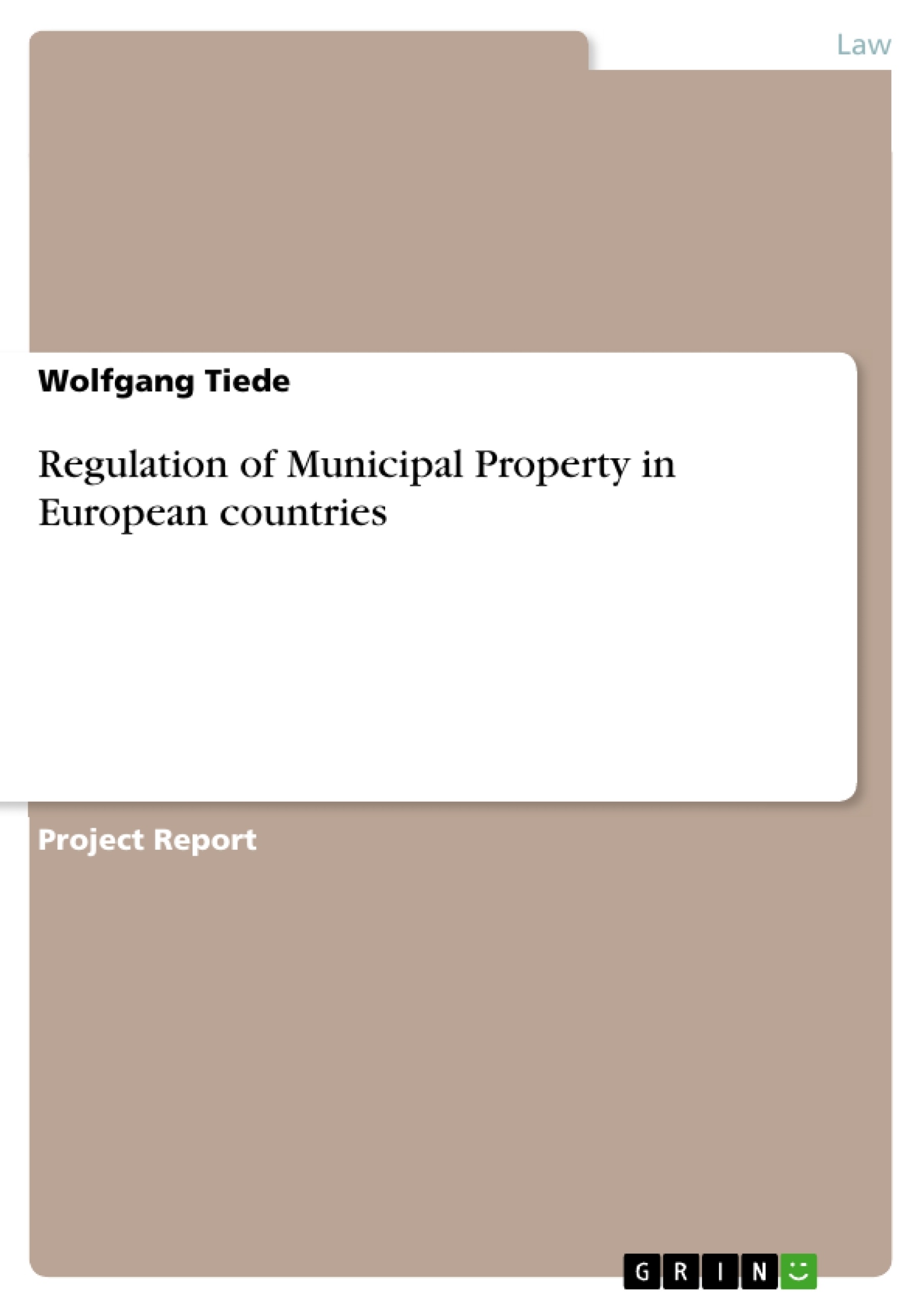In nearly all countries, municipalities own or control substantial amounts of real estate, but few municipal governments think of their holdings as a “portfolio” whose composition might be modified to better serve public purposes. Economists therefore propose that legal and institutional frameworks should be set up in order to enable efficient real property asset management on the local level. However, there are good reasons why municipalities may only participate in economic life in exceptional cases. One reason arises from private law: local authority economic enterprises should not be in competition with the private sector in the free market economy. Another reason is derived from public law: activity and involvement in competition are associated with risks for the municipality. Those risks local authorities should not expose themselves to.
Inhaltsverzeichnis (Table of Contents)
- I. Introduction
- II. Scope of the Paper
- III. Municipal Property in Germany
- 1. Restrictions to the determination of municipal economic activity
- a) Municipal Triad of Restrictions to the Establishment of Economic Enterprises
- aa) Public Wellbeing
- bb) Capability
- cc) Subsidiarity
- b) Setting Up, Taking Over or Essentially Expanding Economic Enterprises
- c) Extraterritorial Municipal Economic Activity
- a) Municipal Triad of Restrictions to the Establishment of Economic Enterprises
- 2. Example: Economic Activity in the Sphere of Banking
- a) Service of General Economic Interest
- b) Regional Principle
- c) Saving Banks and European Union Law
- aa) Art. 86 EC-Treaty
- bb) Art. 87 EC-Treaty
- 1. Restrictions to the determination of municipal economic activity
- IV. Municipal Property in Bulgaria
- 1. Public and Private Municipal Property
- a) Public Municipal Property
- b) Private Municipal Property
- 2. Management of Municipal Property
- 3. Municipal Enterprises
- 1. Public and Private Municipal Property
Zielsetzung und Themenschwerpunkte (Objectives and Key Themes)
This paper aims to provide guidance for developing optimal municipal property structures by analyzing the legal frameworks surrounding municipal property in Germany and Bulgaria. The focus is on exploring the constitutional limits of municipal property at both the European and national levels.
- The paper explores the constraints on municipal economic activity in Germany.
- It examines the role of saving banks as services of general economic interest within the European Union framework.
- The paper discusses the management and privatization of municipal property in Bulgaria.
- It analyzes the restrictions on municipal enterprises and their specific areas of operation.
- The text highlights the interplay between national and EU law in regulating municipal property and economic activity.
Zusammenfassung der Kapitel (Chapter Summaries)
The paper begins by introducing the concept of municipal property and its significance. It outlines the rationale for limiting municipal involvement in economic activities, highlighting both private law and public law considerations.
Chapter III focuses on municipal property in Germany. It delves into the restrictions on municipal economic activity, including the "municipal triad" of public wellbeing, capability, and subsidiarity. The chapter also examines specific forms of economic activity, such as setting up, taking over, or expanding economic enterprises.
Chapter IV explores municipal property in Bulgaria. It examines the categories of private and public municipal property and the procedures for managing these assets. The chapter also discusses municipal enterprises and their designated areas of operation.
Schlüsselwörter (Keywords)
This text delves into the complex relationship between municipal property, economic activity, and constitutional frameworks. Key terms include municipal property, economic enterprises, public wellbeing, subsidiarity, services of general economic interest, saving banks, State aid, privatization, and municipal enterprises.
Frequently Asked Questions
Why are there restrictions on municipal economic activity in Germany?
Restrictions exist to ensure that local authorities do not unfairly compete with the private sector and to minimize financial risks to the municipality's public funds.
What is the "Municipal Triad" of restrictions?
The triad consists of three criteria: Public Wellbeing (the activity must serve a public purpose), Capability (the municipality must be able to afford it), and Subsidiarity (private companies cannot perform the task better or more efficiently).
How is municipal property classified in Bulgaria?
Bulgarian law distinguishes between Public Municipal Property (intended for public use) and Private Municipal Property (which can be managed or privatized more freely).
What role do saving banks play in the European Union context?
Saving banks are often viewed as providing services of general economic interest, but they must comply with EU laws regarding State aid and competition.
Can a municipality expand its economic activity extraterritorially?
Yes, but such activities are subject to specific legal limits to ensure they do not overstep the local authority's regional mandate.
- Quote paper
- Wolfgang Tiede (Author), 2007, Regulation of Municipal Property in European countries, Munich, GRIN Verlag, https://www.hausarbeiten.de/document/169723


